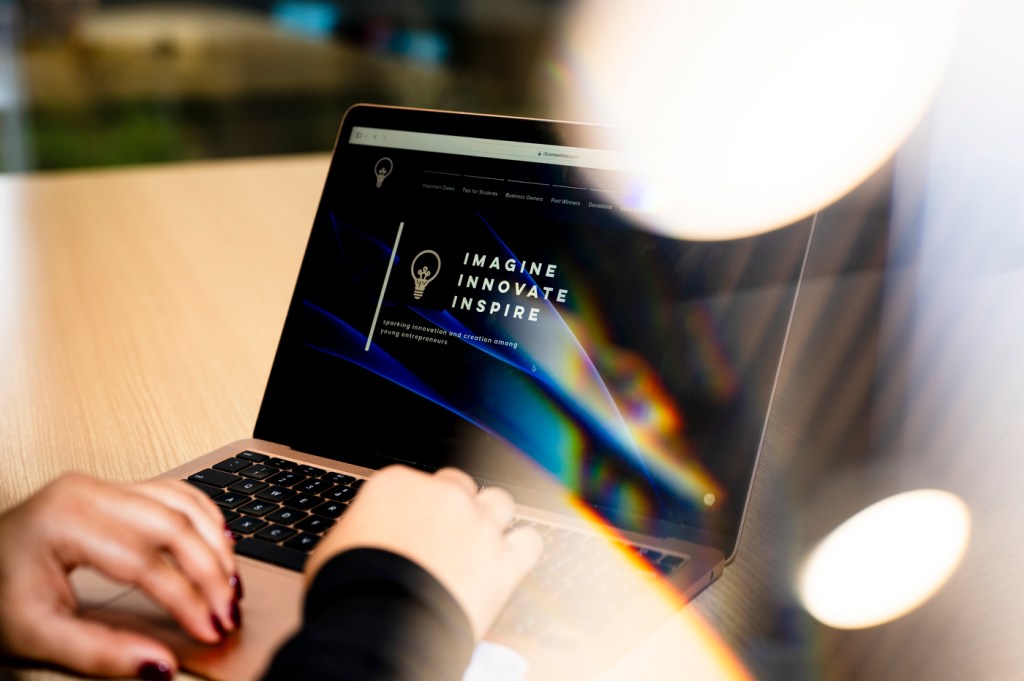Bussiness
Northeastern student’s nonprofit is empowering high schoolers to drive real-world business impact

Aarya Dhru started the I3 Competition as a way for students to get experience working with businesses who need help building a digital presence.

When Northeastern University student Aaryra Dhru was in high school she noticed it could get competitive trying to secure internships and other work experience that enhanced her resume for college.
Dhru, now a third-year finance and data science student at Northeastern, also observed that she and her peers had a lot of the digital and social media skills that small businesses –– like the one her friend’s mother ran –– needed.
So Dhru and her friend at Greenwich High School in Connecticut decided to form an organization that could address this need.
“People were looking for ways to stand out for their college applications,” she said. “At the same time, my co-founder, her mom, is a business owner and she kept talking about how it was so hard to get digital help. A lot of business owners … didn’t grow up using social media or know how to build apps … and they don’t have a lot of resources to spend on getting digital help.”
Dhru and her co-founder, Veda Swaminathan, saw an opportunity to pair high school students possessing the talent to build a website or create social media content with business owners who needed these skills to grow their enterprise.
From this the I3 Competition (I3 stands for imagine, innovate and inspire) was born. I3 works with small business owners and partners them with students who have the skills to match their business needs. This can include app creation, coding and website development, and social media. Recruited students can pick their preferences when applying to the competition.
Now in its fifth year, the I3 competition now has 501(c)(3) status and has helped over 125 high school students get the chance to prove their skills to over 30 businesses, ranging from an app where people can access a lawyer instantly to a pet care company.
“We decided if high school students could help them, it would be a really great opportunity for both parties because the business owners could get that benefit and the students could also get those internships,” Dhru said. “We always see people saying that no one’s giving them a chance and a way to use those skills.”
Students group up in teams of three or four and spend months helping the business in their specified area. They are also assigned mentors who they work with; many of these mentors work in business or are studying it. Some Northeastern students have served as mentors.


“This competition provides invaluable knowledge to these students that they cannot get through textbooks,” said Aarya Patel, a third-year data science and business student at Northeastern who served as a mentor last year. “It’s great for me as well because I get to learn how to interact with different people and apply my knowledge. So it’s amazing for me as well. I’m getting a lot of experience, a lot of insights and a lot of real world application through being a mentor.”
The competition concludes with the teams presenting what they did to a panel of judges who determine which team had the greatest impact. The winning team of students gets $2,000 in prize money.
“They work directly with the business owner and they’re actually creating real change in the company,” Dhru said. “They’re actually posting for that for the business or making a whole new website and working with the business to reflect their needs. … We (then) train them on how to give an outcome pitch. They really like looking at the numbers to see the quantity of impact … like the people that visited the website. That’s what they’re measuring.”
Doing this also allows students to lay out their process and methods and see what worked most.
“Everything they’re doing is for a purpose,” Dhru said. “That’s what a lot of kids have said has really helped them for things like college applications. You’re always going to need ways to kind of market yourself and show that you can do some work. I feel like they really have something to talk about and they know how to articulate because we teach them how to do that with the competition.”
Since its founding in 2020, the I3 Competition has resulted in internship opportunities for many students. Over 80% of the business owners involved have gone on to offer students summer internships after the competition concluded.
From the students’ work, over 60% of businesses involved also said they saw increased traction on their social media.
This year, a group of high school juniors won the competition after creating a “viral formula” for an LA-based tech company that matches pet professionals with pets. The winners helped increase the company’s social media engagement.
But Dhru said there’s been a number of standout stories from over the years. More than just help with social media engagement, the competition helps businesses share their story. For example, one year, the I3 competition worked with Paulina Bryan, who created Live Lawyer, an app that allows people to speak to a lawyer quickly when in need. The idea for the app came from Bryan’s late son who was often pulled over and wished he had such an app.
“She had done a lot of the work toward the business,” Dhru said. “But she felt like people weren’t really listening to her and her story. So she came into the competition kind of looking for some app help. The team was just amazing. They literally learned a whole new coding language just to help her out, and took the concepts that she had and really created something that could be handed to a developer and get it finished and put on the App Store. When I talked to her after, she was just so thankful, and she really was able to get to a completely different stage in her business because of the work that the kids were doing.”
Dhru said the competition also recently began offering funding so students involved can continue working for the business via a paid internship through the foundation.
The group received 501(c)(3) status last year, Dhru said, in the hopes of expanding beyond the competition. Some ideas include offering summer classes and micro grants to students in marginalized communities who want to study entrepreneurship, as well as expanding the reach to work with international businesses.
“Being a part of I3 has truly changed my life,” Dhru said. “We started it when we were so young and I don’t think we necessarily realized how much of an impact we would have with the competition and just how many people were so receptive to getting the help, but also how many students had so many great ideas to help businesses. … Just seeing the impact of these business owners and talking to them after the competition has probably been the most worthwhile thing to me.”









